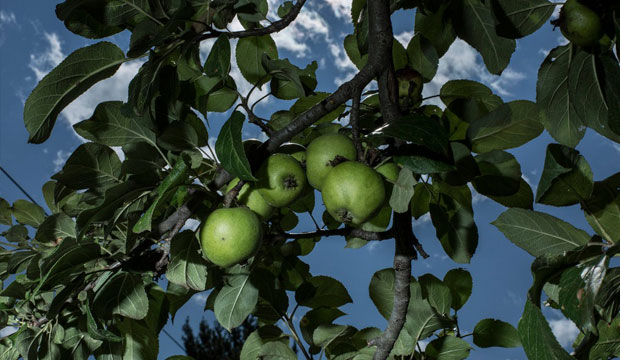George Washington was among the many fans of Newark cider, a long-missing treat now being recreated by a former ad man on a mission.
ASBURY, N.J. — Ironbound Hard Cider may seem an odd name for the business Charles Rosen has built here on 108 acres in central New Jersey. The farm, where a new taproom offers pastoral views of the still-ripening fruit, doesn’t appear to share much with the Ironbound, an industrial neighborhood 50 miles to the east in Newark.
Yet they do have common roots, thanks to four very old apple varieties now growing on Mr. Rosen’s land.
Mr. Rosen, the former chief executive of a Manhattan advertising agency that promoted Svedka vodka and Mike’s Hard Lemonade, wants to reintroduce Newark cider, an 18th- and 19th-century alcoholic drink once famously compared to Champagne.
Newark cider was both a point of pride and big business for the region — requested by name, reportedly lauded by George Washington and produced by dozens of Newark-area cideries with acres of orchards. The secret wasn’t a recipe, but the blending of a quartet of superior apples born in the region: Campfield, Poveshon, Granniwinkle and Harrison, the most celebrated of the four.
As a result of urbanization and then Prohibition, when many of the nation’s remaining cider orchards were destroyed, Newark cider hasn’t been made for at least a century. But after years of planning and planting — not to mention the accidental discovery of two lost apple trees and the investment of what Mr. Rosen called “100 percent of all the money I ever had in my entire life” — Ironbound Hard Cider is on the precipice of bringing it back.
Mr. Rosen, who already produces 50,000 gallons of more mainstream hard ciders each year, hopes that a taste of Newark’s past can help reboot the city’s future: For three years, he has been recruiting former convicts from Newark for his farm crew. As Ironbound Hard Cider expands, he plans to move its nurseries to the city, and has helped change state laws on cider-making so he can move much of its production there, too.
“I wanted to focus on the most underserved individuals,” he said, though he admitted that he also has a more personal connection to Newark cider. “I live in Montclair, six minutes from Newark,” he said. “Where my house is, those trees were once growing.”
Mr. Rosen, 51, who once described himself in an online article as a “socialist, Canadian Jew,” has had many vocations. He came to the United States for law school, then became a movie producer, then moved into advertising, eventually leaving the company he helped found, Amalgamated Advertising, in 2011 with a plan to go into politics or some kind of career in social justice. He was looking for a way to effect change in New Jersey when someone handed him an article about the history of Newark cider in Edible Jersey magazine.
The author, Fran McManus, ended her story with a suggestion: Some of the four apple varieties were already being grown in other states, from cuttings taken from the last old New Jersey trees in the 1970s and ’80s. By all accounts they were delicious, she wrote, so why not bring them back to the state?
Mr. Rosen decided to try. He gathered a team that includes skilled orchardists, bought his land in 2015 and planted several thousand hard-to-find vintage cider-apple saplings.
While he waited for those to grow, he started producing his mainstream ciders — packaged in aluminum cans, the line includes flavors like cherry-cranberry — mainly with apple juice bought from other orchards.
Then he got lucky. In the fall of 2015, a lawyer, Thomas Vilardi, dropped his daughter off to play in her high school marching band, near a former cider mill in Maplewood. “I knew I had seen apples on a tree,” said Mr. Vilardi, an amateur orchardist who had spent years searching for Harrisons. “I wasn’t expecting to find a Harrison.”
Mr. Vilardi sent photographs of the tree to a cider apple expert, who in turn contacted Ms. McManus, who was by then working for Mr. Rosen on cider research.
Mr. Rosen eventually made his way to the tree, then drove back to his farm with a milk jug full of just-pressed juice, pouring out samples for his crew into paper Dunkin’ Donuts cups.
“We prayed to God that the Harrison was a cool tree, if and when we found it,” Mr. Rosen said. “Tasting this juice, we were all, like, ‘Oh, God, this was not only worth it, we’ve hit the motherlode with this thing.”
Another surprise came that same fall, in an email from Wesley Stokes. A manager for AT&T, he had just come home from property he owned in Western New York, where gnarled old fruit trees still grow on the lot. He sat down to read a magazine article about Mr. Rosen’s farm (also written by Ms. McManus); at the end was a description of the Poveshon, the only Newark cider apple thought to be extinct.
By Rachel Wharton, NY Times. Oct. 15, 2018

